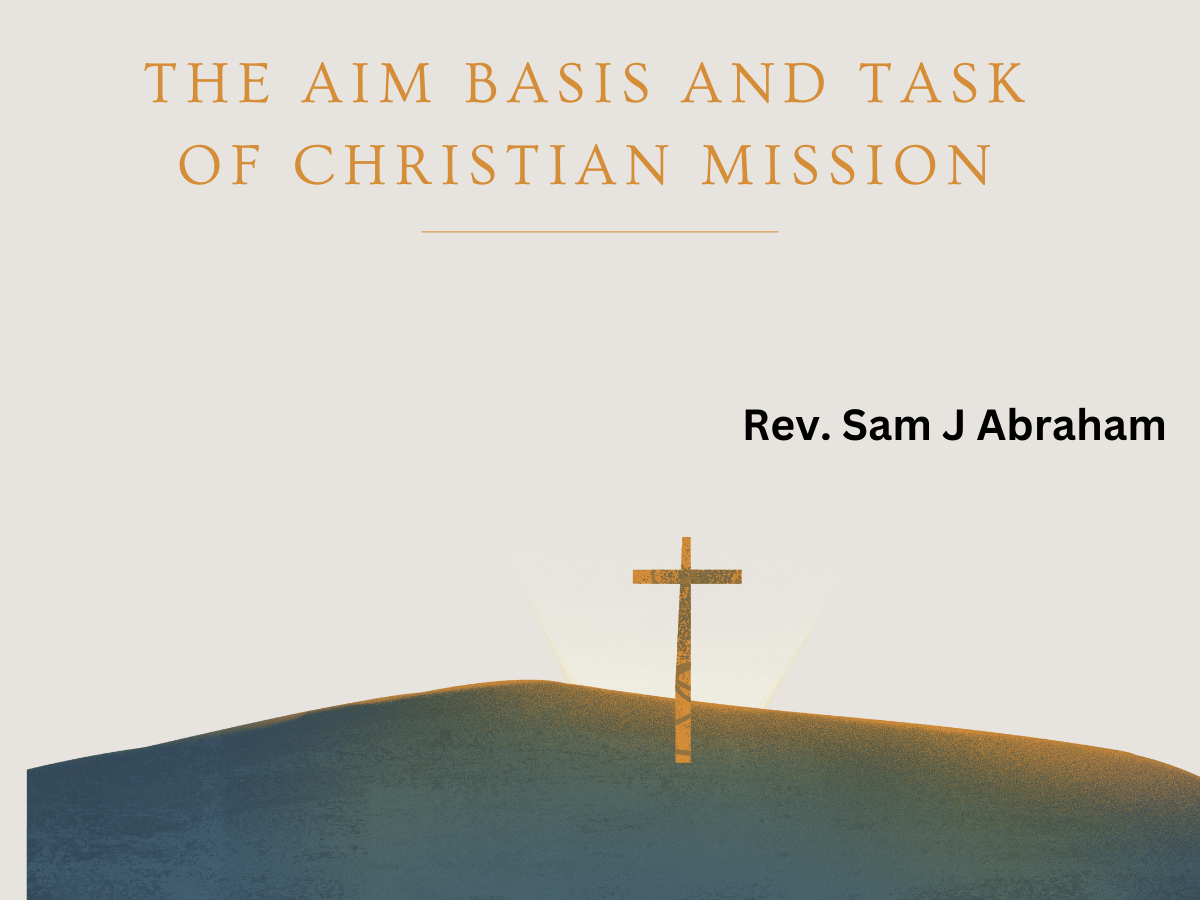
‘On the evening of that first day of the week, when the disciples were together, with the doors locked for the fear of the Jews, Jesus came and stood among them and said, “Peace be with you!” And he said this, he showed them his hands and side. The disciples were overjoyed when they saw the Lord. Again Jesus said, “Peace be with you! As the Father has sent me, I am sending you.’ (Jn. 20:19-21).
What is Mission? Mission is the specific task or purpose which a person or group seeks to accomplish. The Great Commission reflects the essence of Christian Mission. It is the act and fact of being sent. In order to ponder the Johannine text, I would like to divide it into three points:
Aim of Mission: Peace The ultimate aim of Christian mission is ‘Shalom’ i.e. ‘Peace’. It refers to ‘completeness’, ‘soundness’ or ‘well being’. The peace, which the humankind lost as the result of ‘fall’, became the core of ‘Messianic Hope’ of O.T. saints. New Testament presents Jesus Christ as the fulfillment of this hope. Peace is not simply the absence of conflict. Peace is the presence of justice for all. In the power of the Holy Spirit, we are all sent into the violent world to be peacemakers.
The disciples had locked themselves inside a room and Christ comes and tells them, “I send you”. We have only two options: either to be locked in or to be send out, either to flee from realities or to engage with the world. Peace is not possible without struggle. To use a medical illustration, there is a constant struggle in our body between life giving white cells and death bringing virus.
Medical experts say that all normal human beings are exposed to the attack of cancer 15 times in their life but our life-giving cells resist, fight and prevail over the cancer germs, thus saving us from death bringing disease. Death is the moment when this struggle within our body is over when the life giving cells lose their power for struggle and give up. Just as virus and bacteria work against life in human body, there are evils in society against life in the society.
Basis of Mission: God God is the basis of Christian Mission. God send Jesus Christ. Christ send the Holy Spirit and the Triune God sends the Church to the world. Thus the basis of Mission is God himself. In the words of Moltmann, ‘Church exists because there is mission and not vice-versa’. The prayer of Bob Pierce the founder of World Vision, who was shattered by visiting the war-torn countries after the second World War is famous, “ Lord let my heart be broken by the things that break your heart” In mission we discern the work of God and join Him in bringing wholeness. David Bosch in his book ‘Transforming Mission’ affirms one of the most important insights of modern Biblical scholarship and ecumenical consensus, namely that mission is ministry by the whole people of God. Church should be a movement not an institution. T
he three major bases of Jesus’ mission are: Prayer – Jesus displayed the inevitableness of prayer in his earthly life. The time we spend in prayer determines the effectiveness of our mission, Obedience to the Word- Jesus was obedient to the Father even to the point of offering his own life. As Karl Barth we should be able to pray, “Lord, Your will, nothing more, nothing less, nothing else ”. Presence of Holy Spirit – Jesus after commissioning his disciples breathed on them saying, “Receive the Holy Spirit”. The experience of Holy Spirit marked the beginning of a new facet of mission. Our Theology of Mission needs to be biblically rooted, empowered by prayer and guided by the presence of Holy Spirit.
Task of Mission: Holistic Restoration Holistic Restoration is the task of Christian mission. Christian mission is for the world, and the world is the locus of mission. A holistic understanding of scripture presents to us five-fold task of Christian mission: Witness: Bearing witness means both the verbal communication of the apostolic gospel and visual demonstration of its power to bring new life and hope to human relationships and Service: Jesus himself is the servant par excellence, and he calls us to be servants too. As M.M. Thomas suggested, ‘Our commitment to God is put to test in our commitment to human beings. Our commitment to human beings is put to test in our commitment to the marginalised and our commitment to the marginalised is put to test in our action”. Jesus said that the poor are always with us; But the question of great significance is ‘are we always with the poor’?
Liberative Voice: We are called not to create just a society but a just society. The mission that fails to address the social issues fails to be a Christian mission. Steward of Nature: Human, being created in God’s image is to be the caretaker of God’s creation. Human being has to realize that they do not weave the web of life but are merely a strand in it. Role Model: Church needs to display to the world, what it means in practice to be a reconciled and liberated community in the midst of a corrupt, distressed and despairing world. Conclusion We are called to blow the ‘trumpet of justice and love’ as St Paul puts it. Hence, Peace is the aim of Mission; God is the basis of Mission and holistic restoration is the task of mission. Let us go forward firm in our faith, steadfast in our purposes, cautious of the dangers but sustained by our confidence in the providence of God. May the good Lord help us to do our part in God’s mission in our generation! Amen.
Author: Rev. Sam J Abraham is an ordained minister of the Pentecostal Church at Rajasthan


